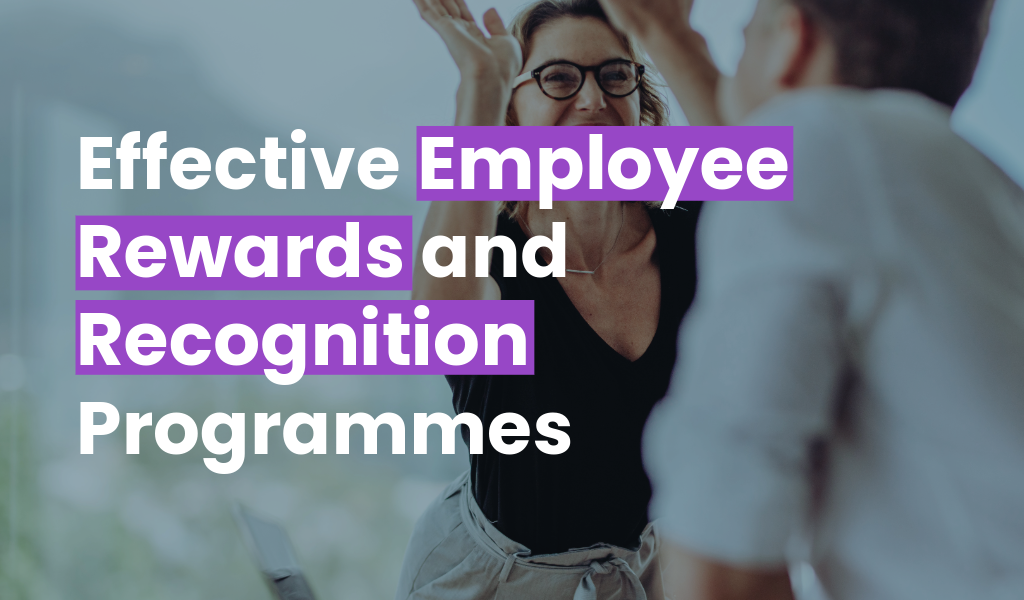


A well-designed employee rewards and recognition programme can significantly improve the overall success of any company. When employees feel appreciated for their efforts—both through tangible rewards and personal recognition—they stay motivated, engaged and loyal to the organisation. By aligning rewards and recognition with company values, businesses can reinforce positive behaviours and create a thriving, high-performance workplace culture.
Over the years, we’ve seen one truth play out consistently—when employees feel valued, they perform better. So, a well-crafted rewards and recognition programme isn’t just a nice-to-have. It’s a powerful tool for fostering loyalty, boosting morale and driving long-term success.
But it’s not enough to simply offer the occasional treat. True impact comes from combining meaningful recognition with carefully chosen incentives. Let’s take you through why these matter and how to make it work.
Skip to:
Why Rewards and Recognition Matter (more than you might think!)
A successful employee rewards and recognition programme is always built on two essential components: rewards and recognition.
Imagine a workplace where effort goes unnoticed.
Employees show up, work hard and leave, but their contributions fade into the background. Over time, motivation wanes and the spark that drives creativity and initiative starts to dim.
Sadly, this isn’t just a hypothetical scenario.
According to a study by Gallup, only one in three employees feel they receive recognition for their efforts.
That’s a massive opportunity being wasted, as recognition isn’t about flattery; it’s about reinforcing behaviours that drive business success.
Rewards add another layer.
They provide a tangible reason to aim higher. Whether it’s a bonus, a gift card or an extra day off, the act of rewarding achievement creates a sense of accomplishment. But for rewards to work, they must feel meaningful and relevant.

To create a successful programme, it’s important to understand the difference between rewards and recognition.
- Rewards typically refer to tangible incentives provided to employees for reaching certain milestones, exceeding performance expectations or demonstrating exceptional work. These can be either monetary, such as bonuses or salary increases, or non-monetary, like gift cards, extra paid time off or experiences such as company-sponsored trips.
- Recognition, on the other hand, is more about the intangible act of acknowledging an employee’s efforts. It can come in many forms, such as verbal praise during meetings, written commendations in company newsletters, or public shout-outs on halls of fame boards. Recognition often holds great emotional value because it acknowledges an employee’s contribution in a more personal and immediate way.
While rewards can provide financial or material motivation, recognition tends to have a more immediate and emotional impact, making employees feel appreciated for their efforts.

How Rewards and Recognition Work Hand In Glove
Recognition without rewards can fall flat. Here’s an example:
An installer spends weeks going above and beyond to ensure a project is completed ahead of schedule. They’re praised at a team meeting, which feels nice in the moment, but there’s no follow-up. The praise is forgotten by the next project and the installer wonders if it was worth the extra effort.
The problem here isn’t the recognition—it’s the lack of reinforcement.
Recognition creates an emotional connection, but rewards provide a long-term incentive. Without both, the impact is limited.
Recognition provides real-time acknowledgment of an employee’s hard work, while rewards offer longer-term incentives for sustained performance and loyalty. When combined effectively, these elements help companies build a positive work culture where employees feel appreciated and motivated to excel.
Imagine a customer care rep who exceeds their monthly service response target. Publicly praising their success in a team meeting (recognition) boosts their morale, while offering them a bonus or extra day off (reward) provides a tangible incentive to continue performing well.

What Happens When Rewards and Recognition Are Missed?
Without recognition, employees feel invisible. Without rewards, they lack motivation to push beyond the basics. This isn’t just bad for morale—it’s bad for business.
Here are the key risks:
 Low Engagement
Low Engagement
Employees who don’t feel appreciated are less likely to engage with their work. According to Gallup, actively disengaged employees cost the global economy $8.8 trillion annually in lost productivity.
 High Turnover
High Turnover
A lack of recognition and rewards is a major driver of attrition. A Glassdoor survey found that 53% of employees would stay longer at a company if they felt more appreciated.
 Missed Potential
Missed Potential
Unmotivated employees rarely go above and beyond. Innovation slows, collaboration declines and growth stalls.
The stakes are clear.
Without a system for rewarding and recognising effort, businesses risk losing both their talent and their competitive edge.

Small vs. Large-Scale Rewards
Not all rewards need to be large-scale to be effective.
Smaller, more frequent rewards can be just as powerful in motivating employees, especially when combined with regular recognition.
In contrast, large-scale rewards such as bonuses, salary increases or promotions are typically reserved for more significant achievements and serve as longer-term incentives for employee performance and loyalty.
The key is to strike a balance between the two, ensuring that employees feel valued on a day-to-day basis while also having something to work towards in the long term.

The Benefits: Why A Little R&R Works Wonders
Implementing a well-structured rewards and recognition programme offers numerous benefits for both employees and the organisation as a whole. By consistently acknowledging the efforts and achievements of employees, companies can boost morale, productivity, retention and attract top talent, all while fostering a positive work environment.
 Improved Morale and Motivation
Improved Morale and Motivation
One of the most immediate effects of regular employee rewards and recognition is an improvement in morale and motivation.
When employees feel their hard work is acknowledged, it naturally boosts their enthusiasm and commitment to their roles.
Recognition creates a sense of accomplishment, making employees feel appreciated for their contributions to the company. This, in turn, drives motivation, leading to higher engagement and performance levels.



![*FREE GUIDE* How to implement a fantastic company culture in 6 steps Enter your business email for instant access. {{ include_custom_fonts({"Poppins":["Semi Bold"]}) }}](https://no-cache.hubspot.com/cta/default/5921162/interactive-188034983837.png)






